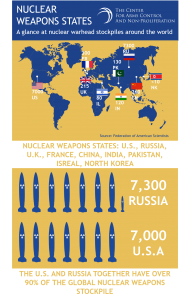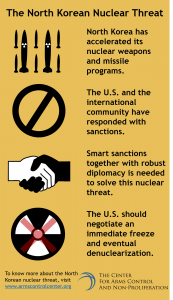What’s News:
Congress’ Call to Expand National Missile Defense Marks the Height of Irresponsibility
The latest conferenced National Defense Authorization bill removes the word “limited” from U.S. policy and instead calls for “an effective, robust layered missile defense system capable of defending the territory of the United States.”
This change would be financially reckless, exceptionally destabilizing, and detrimental to U.S. national security. To read the Center’s press release, click here.
C.I.A. Chief Warns Donald Trump Against Tearing Up Iran Nuclear Deal
In an interview, the director of the C.I.A. cautioned President-elect Donald J. Trump that tearing up the Iran nuclear deal would be “the height of folly.”
He warned that scrapping the Iran deal would undermine U.S. foreign policy, embolden hard-liners in Iran and threaten to set off an arms race in the Middle East by encouraging other countries to develop nuclear weapons. To read the article, click here.
U.N. caps N. Korean coal sales in bid to deprive it of hard currency after nuclear tests
The United Nations Security Council unanimously adopted new sanctions against North Korea, capping its coal exports in response to the country’s fifth and largest nuclear test in September. To know more, click here.
Read:
Major Differences Between House, Senate, & Conference Fiscal Year 2017 Defense Authorization Bills
The House and Senate had major differences between their National Defense Authorization bills. After extensive talks, the two chambers negotiated a “compromise” bill incorporating elements of both original bills. Click here to see the Center’s analysis on the newest bill.
Making Government Work: Why the Pentagon Must Pass a Clean Audit
The Pentagon cannot account for how it spends its roughly $600 billion in annual resources. In 1990 Congress passed the Chief Financial Officers Act, which mandated that all major federal agencies pass an audit by 1992, yet the Pentagon has never done so. Executive Director John Tierney and former Congressman Chris Shays explain why the Pentagon must be held accountable. Click here to read their op-ed.
Ask an Expert: Dr. Jim Walsh on the North Korean Nuclear Threat
Council Board member, Dr. Jim Walsh analyzes the threat that North Korea’s nuclear weapons program poses to the U.S. and its allies, offers options for a U.S. response, and proposes recommendations to increase the effectiveness of U.S. engagement with South Korea, Japan, China and North Korea to eventually realize the goal of North Korean denuclearization. Click here to read the interview.
Withdrawing from the Iran Deal Would Be a Disastrous Mistake
President-elect Trump has repeatedly attacked the Iran nuclear deal, referring to it as a disaster and at one point promising on the campaign trail to tear it up. So what would happen if he were to scrap the Iran deal? Read Communications Director Hazel Correa’s blog post to find out.
The Art of the Deal: Russian Style
President-elect Donald Trump has long bragged about his ability to negotiate good deals. A good test of that facility will come when he is dealing leader-to-leader with President Vladimir Putin of Russia. Senior Fellow John Isaacs raises important questions President-elect Trump will have to address when negotiating with Russia. To read the piece, click here.
Infographic: Nuclear weapon stockpiles around the world
With 7,300 and 7,000 nuclear weapons respectively, Russia and the United States together have over 90% of the global nuclear weapons stockpile. Look at the Center’s infographic below and click here for a printable version.
Infographic: The North Korean Nuclear Threat
North Korea’s nuclear weapons program is improving at an alarming rate. The U.S. must adopt smart sanctions together with robust diplomacy to tackle the North Korean nuclear threat. See the Center’s infographic below and click here for a printable version.
Volunteer:
The Center for Arms Control and Non-Proliferation Needs a Web Guru
This is a critical time for international nuclear relations: U.S.-Russia, North Korea’s nuclear proliferation, India and Pakistan, just to name a few. The Center for Arms Control and Non-Proliferation seeks to reduce nuclear weapons arsenals, halt the spread of nuclear weapons, and minimize the risk of war by educating the public and policymakers. But the Center needs help with spreading our message and amplifying our impact.
The Center is looking for a volunteer to help redesign the Center website’s overall look, feel and layout to make it user-friendly, visually appealing and improve its accessibility. To know more, click here.


